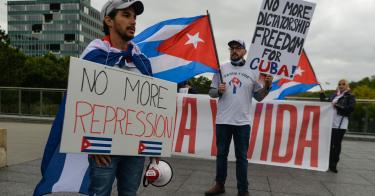The Cuban people continue to cry for freedom. The Cuban regime continues to press, harass and arrest protesters, while organizing counter demonstrations. Both are waiting to see what Washington does next.
There is little question that the Biden administration’s initial impulse was to follow former President Obama’s lead. Obama removed Cuba from the list of state sponsors of terrorism, restored diplomatic relations and eased travel and commercial restrictions.
But Obama’s expectation of reciprocal economic and political liberalization was never fulfilled. Soured by Havana’s lack of progress, Trump in 2017 began reversing his predecessor’s Cuba policies.
A number of liberals are trying to blame the latest round of brutal repression on the Trump sanctions and are demanding they be lifted. Not all Democrats agree. For example, Senate Foreign Relations Committee Chairman Bob Menendez (D-N.J.) argues that the regime must make major structural changes before any sanctions are lifted.
>>> Long-Suffering Cuban People Yearn for Economic Freedom
Biden is stuck in the middle.
For Biden, the contest between democracy and authoritarian rule has been an enduring personal concern. Speaking in Copenhagen in 2018, the former vice president warned of “repressive regimes… strengthening their grip on power” while “increasingly projecting authoritarian influence beyond their borders.” He worried aloud about “the misguided perception that Western democracy may no longer offer the best path to geopolitical success”—even though democracy clearly has the world’s best record for advancing freedom.
At this year’s Munich Security Conference, Biden said, “We must demonstrate that democracies can still deliver….”
Now in the face of the Cuban cry for freedom, he has to decide how democracy will deliver. How it responds to the unfolding economic, political and social tragedy across the Florida Straits will determine whether the administration has a Cuba policy at all—and whether there is any substance behind the declarations of its new foreign policy.
The biggest obstacle, of course, is the lack of a willing or capable partner in Havana. The regime has completely mishandled COVID-19. Positive COVID cases and deaths are soaring. Hospitals are overloaded and near collapse. Pharmacies lack basic medicines. The Cuban-made vaccines are not plentiful, and some don’t work.
In 2020, the island’s already impoverished economy shrank by 11 percent, the largest decrease since the 1990s.
The Cuban Communist Party blames the U.S. Yet, even before the Trump sanctions, the party demonstrated it was unwilling to deliver the political and economic reforms needed to attract the level of foreign investment it had hoped for following the Obama administration’s rapprochement.
It strains credulity that the Trump embargo and sanctions are responsible for the lack of civil liberties and free speech on the island. In fact, while the pandemic provides a proximate reason for the unrest, the deeper reasons are about systemic and longstanding failures of communism. For instance, in 2018 (long before the pandemic) the San Isidro Movement arose to protest censorship of the arts. Calling for freedom of expression, members of the movement—artists, intellectuals, writers and musicians—have suffered arrest and imprisonment. Yet even this persecution (and now a pandemic) has not silenced their cries for more freedom.
The mass protests we’ve witnessed in Cuba’s streets the past few days are far broader than the San Isidro Movement. And they are marked by chants having very little to do with the pandemic. People are calling for “Libertad” (freedom), and “Patria y Vida” (homeland and life) versus “Patria o Muerte” (fatherland or death), Fidel Castro’s slogan for the nation’s communist revolution.
Further, throughout the decade, under Obama as well as Trump, the Cuban regime continued to be an unrelenting enemy of freedom in the Western Hemisphere. It has helped prop up the despicable, undemocratic regime in Venezuela even as it neglected its people at home.
Returning to Obama’s policies won’t bring a better life to the Cuban people or make Cuba a more responsible government. The Cuban government controls the public and private sector: Any money that flows into the country—from tourism or trade goods—flows through the regime’s fingers, strengthening and empowering its authoritarian leaders.
The Trump sanctions may not bring freedom to the Cuban people. But reversing them is a surrender to the world’s illiberal forces—exactly what Biden said he did not want to do. The Biden administration’s best bet is to keep the Trump-era Cuba policy in place as it develops a bipartisan grand strategy focused on achieving political transition in Cuba.
This piece originally appeared in The Hill on 07/21/21





